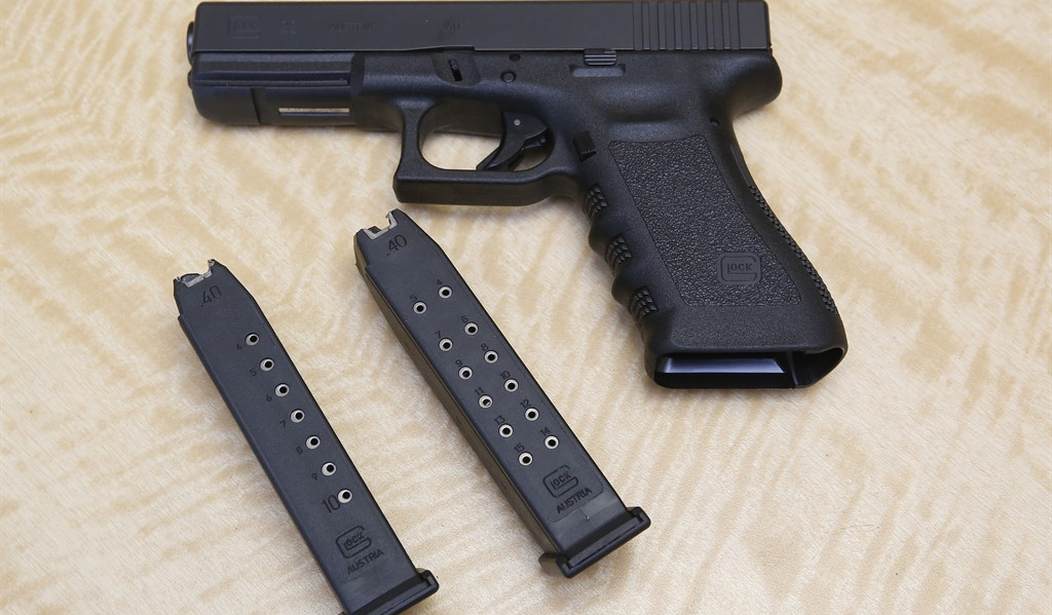When you read the text of a lot of gun control laws, you’ll find exemptions for police. It seems the gun-grabbers who insist no law-abiding citizen needs more than 10 rounds in their magazines also believe that the cops should have as many rounds as possible.
See, they don’t actually think there’s no legitimate uses for such magazines, just to run with the same example. What they’re trying to say is there’s no legitimate use for you to have such magazines.
The whole argument, though, is that good guys don’t need X…except for these particular good guys.
David Kopel, writing at The Volokh Conspiracy, argues otherwise.
But in this post, I will focus on a more fundamental argument in the brief. The law enforcement amici reject the claim that arms universally recognized as appropriate for ordinary law enforcement officers should be banned for ordinary citizens. The claim is based on the pernicious idea that law enforcement officers are above the people, rather than part of the people. Here are some excerpts from the brief:
The magazine ban attempts to divorce today’s common arms of law-abiding citizens from today’s common arms of law enforcement officers, including sheriffs and their deputies. The divorce, contrary to the wishes of both parties, endangers citizens and officers alike.
The arms of ordinary law enforcement officers are carefully selected for only one purpose: lawful defense of innocents in civil society. Throughout American history, many citizens have looked to law enforcement for guidance in choosing arms for the same purpose. Denying those arms to citizens and to retired law enforcement officers endangers them for the same reasons that denying these arms to active law enforcement officers would endanger them. The most important reason is the necessity of reserve capacity, as detailed in Part II.
More fundamentally, the magazine ban violates the principles of our Constitution and of American law enforcement. Policing by consent is the American value, not militarized occupation from above.
The magazine ban is based on the sponsors’ repeated claim that the “one purpose” of magazines over 15 rounds is “to kill large numbers of people quickly.” This false characterization was never challenged by any legislator who voted for the bill. The pernicious notion that Colorado law enforcement officers routinely carry arms for the “one purpose” of mass killing creates a false division between officers and the citizens whom they serve. The notion reduces citizen cooperation with officers, and also endangers officers. . . .
He’s not wrong. Not in the least.
If the only reason for these magazines is “to kill a large number of people quickly”–and where have we heard that description before?–then the last people who should need them would be the police.
Yet law enforcement does have need of them. They need them because they don’t know what kind of threats they might face and no one ever survives a gunfight and wishes they’d had less ammo.
For that same reason, though, law-abiding citizens need access to the same magazines. Not only do we not know what threats we have, we’re less likely to have an armed partner or a radio to call backup.
While Kopel is talking about magazine restrictions here, the truth is that this also applies to other things we’re told only exist “to kill a large number of people quickly.” In particular, so-called assault weapons.
Many police officers carry these in their cars. They’ve done so ever since the North Hollywood Shootout made it pretty damn clear that pistols might not be enough. They routinely have access to AR-15s or similar firearms.
Do they have them to kill a bunch of people quickly? One would imagine not.
However, the idea that law enforcement should have tools beyond what you or I have access to, “treats police like soldiers of an occupying army,” as Kopel described the magazine ban, thus illustrating the problem.
Obviously, I agree with this.
It should also be noted that the police, for all the good they do, aren’t devoid of a criminal element. Bad guys can slip through the cracks. We’ve seen examples over and over again through the years, and while those are just a tiny fraction of those who wear the badge, the same can be said of people with higher capacity magazines or “assault weapons.”
It’ll be interesting to see how the case in question goes, because I totally agree with Kopel’s arguments here.








